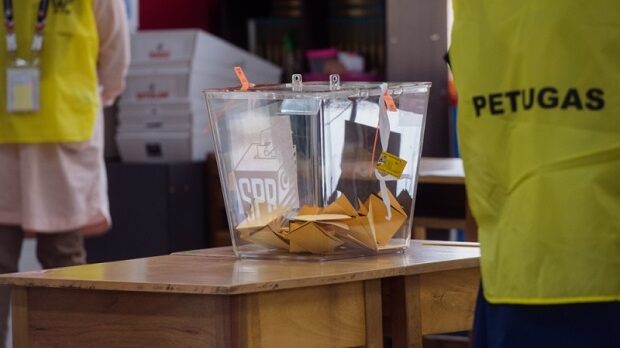ELECTION FEVER GRIPS PENANG ‘LIKE NEVER BEFORE’ – WHAT WILL IT BE? A LANDSLIDE WIN FOR PAKATAN? – A SHOCK UPSET FOR PN? – IT ALL HINGES ON THESE 15 MALAY-MAJORITY SEATS…
Breaking down the numbers in Penang
WITH nomination day 11 days away, Penang has been gripped by election fever like never before.
The state has been abuzz with political chatter for the past few weeks, with the chief minister post topping the list.
Expect lots of talking points as politics is set to dominate until polling day on Aug 12.
Without the power of incumbency at the federal level, it will be interesting to see how Perikatan Nasional stacks up against the Pakatan Harapan-Barisan Nasional unity government in this state election.
Both sides are trying hard to woo Undi18 voters. This has seen Prime Minister Datuk Seri Anwar Ibrahim actively reaching out to this segment of voters through his recent varsity tours.
Last month, Perikatan chief Tan Sri Muhyiddin Yassin said the coalition was confident of securing almost 20 seats in Penang despite Pakatan’s dominance since 2008.
All it needs is 21 seats to wrest the state from Pakatan, he said, adding that the coalition was receiving “extraordinary” support from Malay voters.
Penang Pakatan chairman Chow Kon Yeow said winning 30 to 32 seats would be a satisfying result, adding that the goal was within reach, based on results of past elections.
So, who has the numbers? In Penang, there are 15 Malay-majority seats.
Based on the data from the 15th General Election (GE15), Pakatan secured more than 60% of votes (excluding postal votes) in 25 of the 40 seats in the state, which is two seats short of a two-third majority.
Nineteen of them were DAP seats while the remaining six were PKR’s. The manner in which DAP won so convincingly in 16 of the 19 seats it contested was simply stunning.
The seats in which it obtained more than 70% of votes were Berapit (91.65%), Pengkalan Kota (90.06%), Paya Terubong (88.78%), Batu Lancang (87.53%), Sungai Puyu (86.79%), Padang Lalang (85.30%), Air Putih (84.78%), Perai (82.87%), Komtar (81.31%), Padang Kota (80.97%), Pulau Tikus (80.61%), Bagan Jermal (80.59%), Seri Delima (76.22%), Jawi (75.77%), Ayer Itam (74.77%) and Bagan Dalam (73.45%).
PKR, too, had a good showing in three seats – Kebun Bunga (86.01%), Bukit Tambun (78.51%) and Batu Uban (73.71%).
Remarks by certain Perikatan leaders did not help their cause, especially claims on Penang belonging to Kedah and assertions that non-Muslims comprised the majority arrested for giving and taking bribes.
Based on the GE15 results, the combined votes of Barisan and Pakatan would have seen them through easily in some Malay heartland seats.
But in politics, one plus one rarely equals two.
Supporters from both sides may not vote for each other, given their political animosity and disagreements over the years.
Although the “green wave” will sweep through certain seats on the mainland, Pakatan looks likely to be returned for a fourth term with its new found ally – Barisan – albeit with a less impressive victory this time around.
Since 2008, the coalition has been in total control, sweeping to victory in 29 seats (2008), 30 (2013) and 37 (2018).
It will be hard to bring down the Pakatan fortress, unless Perikatan is able to release a comprehensive manifesto during the campaign period.
Besides the state government achieving a record-breaking total approved manufacturing investments of RM76.2bil in 2021, Penang’s tourism revenue is also on the rise.
The state continues to receive international recognition on many fronts and Penang is widely regarded as a model city.
While caretaker Chief Minister Chow is getting another shot at the state’s top job should the unity government alliance win, the fate of some party seniors hangs in the balance.
This came after secretary-general Anthony Loke, in a statement, said there would be “major renewal” in the DAP’s exco line-up should the alliance retain the state for a fourth term.
The process, he said, was necessary to ensure the continuity of the state leadership and ensure younger, dynamic heads lead Penang.
This has put three senior leaders – Dr P. Ramasamy, Phee Boon Poh and Chong Eng – in the spotlight.
Phee and Chong, especially, had fought the good fight in many election battles dating back to the 1990s. All three will always have a place in the political history of Penang.
Phee, a three-term exco member, gained fame as a vocal opposition leader taking on 38 Barisan representatives in the state assembly when he was the sole DAP assemblyman from 2004 until 2008.
Despite being overwhelmed, the “lone ranger” and PAS’ Mohd Hamdan Abdul Rahman raised many issues under the state administration headed by Tan Sri Dr Koh Tsu Koon then.
When the DAP first came to power in 2008, Phee was instrumental in implementing many environmental and green policies, including introducing the “No Plastic Bag Day”.
Chong will always be remembered as the sole Opposition member who took on the might of Barisan in the Penang state assembly from 1995 to 1999.
She has spent decades ensuring gender equality, be it in the state government or private sector.
Her latest project of ensuring childcare centres in workplaces and industrial areas has also won plaudits.
Ramasamy is the first Indian Deputy Chief Minister in the country.
His giant-killing act of taking down Dr Koh, who was then the Gerakan acting president, in 2008 is etched in the minds of many.
While the coming term will most likely be Chow’s swan song, it remains to be seen whether his team members in the state will be given another go in the upcoming polls.
ANN
.
